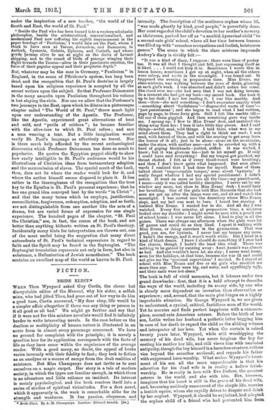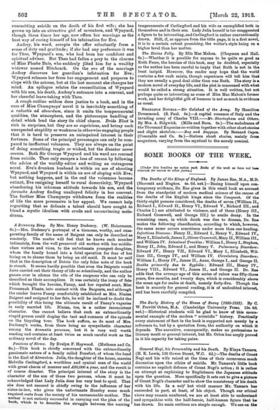FICTION.
BRIDE ELECT.*
WHEN Theo Wynyard asked Guy Curtis, the clever but disreputable editor of the Moment, why his sister, a selfish minx, who had jilted Theo, had gone out of her way to do him a good turn, Curtis answered, "My dear chap, life would be a simpler affair altogether if there was any thing or person in it all good or all bad." We might go further and say that if it were not for this mixture novelists would find it infinitely harder to write interesting novels. In the case before us the dualism or multiplicity of human nature is illustrated in an acute form in almost every personage concerned. We have no ground for complaint with the principle ; it is merely a question how far its application corresponds with the facts of life as they have come within the cognizance of the average reader. With a good many, no doubt, the appeal of books varies inversely with their fidelity to fact; they look to fiction as an anodyne or a means of escape from the drab realities of existence. But Miss Champneys does not invite us to seat ourselves on a magic carpet. Her story is a tale of modern society, in which the types are familiar enough, in which there is no adventure and little reliance on incident. Its interest is mainly psychological, and the book resolves itself into a series of studies of spiritual vicissitudes. For a first novel, which it apparently is, the work is remarkable alike for its strength and weakness. It has passion, eloquence,' and • Bride Elect. By A. M. Champneys. London : Edward Arnold. [6e.] intensity. The description of the mutinous orphan whose lif.. " was made ghastly by kind, good people," is powerfully done. Her aunt regarded the child's devotion to her mother's memory as idolatrous, packed her off as "a morbid, hysterical child "to a second-rate girls' school, where all her time between lessons- was filled up with " senseless occupations and foolish, boisterous games." The scene in which the class mistress impounds Audrey's diary is vividly felt:— "It was a kind of diary, I suppose : there were lines of poetry
too. It was all that I thought and felt, just expressing itself as it liked. . . . I could not keep it in. Sometimes I wrote this in lesson hours ; sometimes I got up at night, when all the others were asleep, and wrote in the moonlight. I was found out. It happened one evening in preparation time. Miss Evans, my class-mistress, was walking between the rows of desks, glancing at each girl's work. I was absorbed and didn't notice her come. She stood over me—she had seen that I was not doing lessons-
In a moment she had got my book—my sacred book. She took it
up to her desk : I saw her reading it. I was like marble. And then—then—she said something—I don't remember exactly what- -something about foolishness'= disgraceful waste of time '-
`just just punishment '•, and she began to read what I had written, page by page, to those forty girls. Still I felt like marble till—
till one of them giggled. And then something gave way inside me. I sprang up: I flew to Miss Evans' desk, and snatched the thing away from her: I tore it into little tiny pieces. And I said things—awful, mad, wild things. I told them what was in my mind about them. They had a right to think me mad : I was mad, with hatred of them, and with the craving to get away from the horror of it all ; just to be alone—alone on the mountains, under the stars, with mother near—not to be crowded up with a herd of gaping blockheads—jostled, stifled. It was wicked, I
know; but it was glorious too—just to let myself go. If only
I could have said everything ! But my tongue got parched, my throat choked. I felt as if every blood-vessel were breaking; and then I don't know quite what happened. But soon after- wards I realized that I had done for myself. Some of them talked about 'ungovernable temper,' some about 'hysteria.' I really forget whether I had any special punishment: I didn't notice. It went on more or less all the time—my punishment, I mean—only it was called healthy discipline. I never at by my window any more, but close to Miss Evans' desk: I could hear her breathing. One of the girls told Miss Macneile that she had seen me get up after the lamps were out, and sit and watch the moonlight. I was moved into the dormitory where Miss Evans slept, and my bed was next to hers. I heard her snoring. I loathed Miss Evans. I wanted her to die. And all day I was
watched. Every five minutes, at preparation time, a mistress
looked over my shoulder: I might never be seen witha pencil out of school hours : I was never left alone. I had to play in all the games. There was always one afternoon when the girls were let off games and could do as they liked. I spent it walking with Miss Evans, or doing exercises in the gymnasium. That was good, you see, for hysteria. I never lost my temper any more. I hadn't the energy, and it wasn't worth while. But I lived in a kind of black dream. I knew I should do something if I ever had
the chance, though I hadn't the least idea what. There was nothing to be gained by running away : Aunt Annie's was almost as bad. And she wouldn't have let me stay : I never went home, oven for the holidays, at that time, because she was ill and could not give me the 'personal supervision' I needed. So I stayed at school with Miss Evans and five or six girls who revolted me more than any. They were big, and noisy, and appallingly ugly, and their nails were not clean."
The book is full of vivid moments, but it labours under two grand drawbacks : first, that it is a bold attempt to describe the ways of the world, including its seamy side, by one who is clearly more dependent on invention than observation or experience ; and, second, that the main plot hinges on a highly improbable situation. Sir George Wynyard is, we are given to understand, a cynical, critical, fastidious man of the world. Yet he marries and finds perfect happiness with a common-
place, second-rate American actress. Before the birth of her son, Lottie writes her husband a pathetic letter begging him in case of her death to regard the child as the abiding witness
and interpreter of her love. Yet when the curtain is raised twenty years later, Wynyard, while still worshipping the memory of his dead wife, has never forgiven the boy for costing his mother her life, and still views him with unabated antipathy, though the boy himself is a harmless creature, with no vice beyond the cacoethes scribendi, and regards his father with suppressed hero-worship. What makes Wynyard's treat- ment of his son all the more unpardonable is that his adoration for his dead wife is in reality a hollow fetish- worship. He is really in love with Eve Dufour, the greatest actress in the world, and she with him. Eve, however, imagines that his heart is still in the grave of his dead wife, and, becoming suddenly enamoured of the simple life, marries a loutish squire, whom she rapidly drives to despair and drink by her neglect. Wynyard, it should be explained, had adopted the orphan child of a friend who had prevented him from
committing suicide on the death of his first wife; she has grown up into an attractive girl of seventeen, and Wynyard, though three times her age, now offers her marriage as the best way of curing himself of his infatuation for Eve.
Audrey, his ward, accepts the offer reluctantly from a sense of duty and gratitude ; if she had any preference it was for Theo, Wynyard's son, who had been her confidant and spiritual adviser. But Theo had fallen a prey to the charms of Miss Phcebe Dale, who suddenly jilted him for a wealthy widower named Hitchcock. On the eve of the marriage Audrey discovers her guardian's infatuation for Eve ; Wynyard releases her from her engagement and prepares to elope with the actress, but at the last moment she changes her mind. An epilogue relates the reconciliation of Wynyard with his son, his death, Audrey's entrance into a convent, and her cheerful leave-taking with Theo.
A rough outline seldom does justice to a book, and in the case of Miss Champneys' novel it is inevitably something of a reductio ad absurdum, since it omits the temperamental qualities, the atmosphere, and the picturesque handling of detail which lend the story its chief charm. Bride Elect is rich in surprises, but they are so capricious, and betray such unexpected stupidity or weakness in otherwise engaging people that it is hard to preserve an unimpaired interest in their fortunes. Some of the principal personages can only be com- pared to ineffectual volcanoes. They are always on the point of doing something tragic or wicked, but the disaster never occurs. Both Sir George Wynyard and his ward are rescued from suicide. Theo only escapes a loss of reason by following the advice of the worldly editor and writing an outrageous novel. Eve's drunken husband is within an ace of shooting Wynyard, and Wynyard is within an ace of eloping with Eve; but nothing happens, and in the end the volcanoes become extinct, Eve resigning herself to rural domesticity, Wynyard abandoning his inhuman attitude towards his son, and the farouche Audrey finding unalloyed felicity in her convent. The further Miss Champneys withdraws from the realities of life the more persuasive is her appeal. We cannot help regretting that so delicate a talent should have sought to blend a mystic idealism with crude and unconvincing melo- drama.















































 Previous page
Previous page